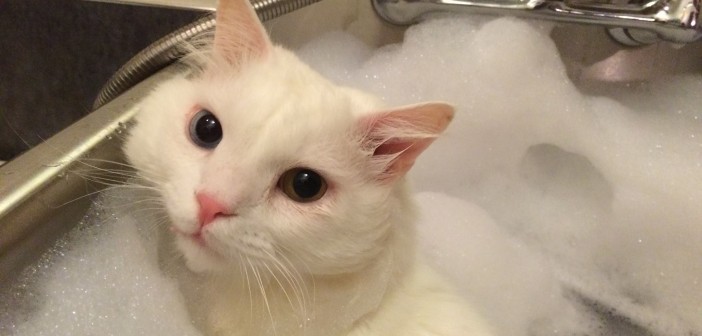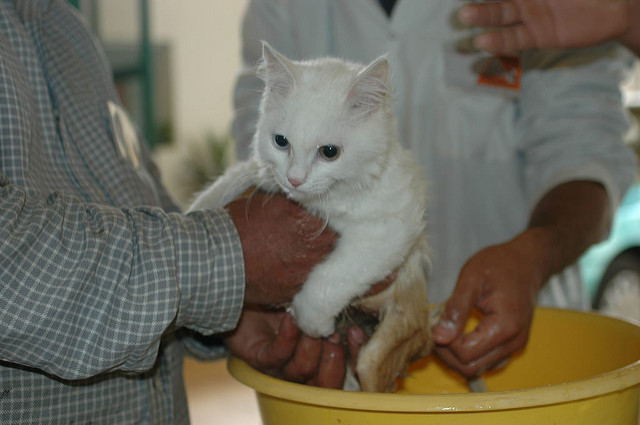This adorable creature is Elrond. He’s a paraplegic kitty unable to move his back legs, whom my mother Kim Bartlett and I found at a shelter in Egypt struggling to care for him with very limited resources. We adopted him, sponsoring his care and then flying him to the U.S. where he has lived with us ever since. He has a big padded cage to stay in at night, and spends his days in a cart we wheel around different parts of the house. Because he can’t help but soil himself, he receives baths in the sink twice every day to clean him up.
Until Elrond was examined by a veterinarian in the U.S., we actually believed he was a girl, as his genitalia were damaged such that the Egyptian vets could not discern male organs. We named him Rania, after the queen of Jordan who is a generous supporter of animal welfare causes and one of the most all-around decent monarchs currently in power. His new male name, Elrond, was chosen after the Lord of the Rings character based on his elfin appearance.
Another of our cats, a big macho tomcat named Mango, is very fond of Elrond. He likes to get in Elrond’s cart with him, and to vigorously groom him whenever I set him in a chair or on the ground, as when I’m holding him and need to attend quickly to some chore. Recently I saw Mango put his arm around Elrond, bite his neck, and begin to mount him as if he were trying to mate. This made me wonder if perhaps Elrond is in some sense female after all; if, despite having male organs, he might be internally hermaphroditic, or else produce female pheromones causing humans and cats alike to automatically perceive him as a girl.
Note that Mango does sometimes engage in mating-type behaviors with other male cats. However, in all other cases it’s been him allowing more submissive toms to mount him; the only cats he mounts himself are females. This is opposite to dogs, in which alphas (or claimants to the title) mount other individuals as a display of dominance, but consistent with other cats, among whom I’ve often observed dominant males mounted by their subordinates but never the reverse.
Is there a moral to all this for human beings? Of course it would be misguided to relate other species’ social behaviors directly to our own, since after all dogs and cats differ markedly from each other despite being much more closely related than either is to us. Yet it does suggest that even in non-human animals, gender and sexuality may be a good deal more complex than just genitalia and chromosomes, and that those who presume to judge other people’s identities as “unnatural” might want to rethink their assumptions.
__
UPDATE: On July 1st, 2016, Elrond passed away suddenly following a severe fungal infection. Paralyzed in his hind legs, Elrond nonetheless knew joy in being held, fed, and rolled around the house in his “chariot,” a transparent plastic box mounted in a postal cart. The baby of the household, he demanded much effort to care for, but in return inspired boundless delight through his cuteness and playful, shy yet upbeat personality. He was happy in his final moments being held in my mother Kim‘s arms. I take comfort in picturing him reborn with wings, soaring through golden skies with the boundless freedom of motion denied him in this life. Goodbye, Elrond. May we someday meet again, before the end of time.








1 Comment
An amazing and inspiring gift to us all, Wolf. I am so glad you were able to give him a good life. His passing through this world will be imprinted on my mind for a long time, along with the memories of my own feline children.